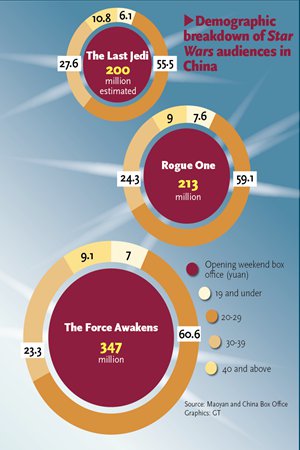
Demographic breakdown of Star Wars audiences in China Source: Maoyan and China Box Office (Graphics/GT)
'The Last Jedi' set to become the lowest-earning 'Star Wars' film of recent years in the Chinese mainland
Despite its status as the highest-earning film of 2017 in North America, Star Wars: The Last Jedi failed to take first place during its opening weekend in the Chinese mainland.
Premiering on Friday, the latest film in the Star Wars franchise grossed 64.9 million yuan ($10 million) on its opening day and an estimated 200 million yuan over its first weekend to come in at second place behind the hit Chinese romance comedy The Ex-File: The Return of the Exes, which was in its second weekend. This result puts The Last Jedi on track to becoming the lowest-earning film among the three most recent Star Wars films that have shown in China, the others being Star Wars: The Force Awakens (347.98 million yuan for the first weekend) and Rogue One: A Star Wars Story (213.27 million yuan).
With Chinese movie site Maoyan predicting that the film's screen share will drop to 26.8 percent on Monday, and more domestic and imported blockbusters, such as Jumanji: Welcome to the Jungle, coming next weekend, it looks highly unlikely that this Hollywood mega-franchise will make an impressive impact on the world's second largest film market.
Losing young moviegoers
According to a demographic analysis on Maoyan, the below-30 audience turnout for The Last Jedi was much lower than that of the three highest-earning Hollywood films in China in 2017: The Fate of the Furious, Transformers: The Last Knight and Pirates of the Caribbean: Dead Men Tell No Tales. For example, the 20-29 age group, which are the major box office contributors in China, only accounted for 55.5 percent of audience for The Last Jedi, while this percentage for the other three films stood at 62.1 percent, 58.7 percent and 61.1 percent respectively. This indicates that The Last Jedi failed to attract young audiences who were not Star Wars fans.
Knowing that Star Wars is a film series that relies heavily on fans, its Hollywood producers were well aware that something had to be done to build a fanbase in the Chinese mainland, which never saw the theater release of the first three films that started it all.
That was why they chose pop star and idol Lu Han to be their Star Wars ambassador in China for The Force Awakens when it was released in the mainland in 2015. When it came to Rogue One, two well-known Chinese actors, Jiang Wen and Donnie Yen, were chosen to play major roles in the film. As a result, the 20-something demographic for these two films were 3.6 percent higher than The Last Jedi in China.
The Last Jedi's weak performance in the mainland was actually predicted by Chinese theater managers. Statistics on Maoyao show that The Last Jedi was given a screen share of 42.4 percent on its opening day, the lowest screen share among all the Hollywood blockbusters mentioned above. This lower screen share seems to be the norm for Star Wars in general, as all three films were given a less than 64 percent screen share, while Transformers: The Last Knight had the highest at 78.5 percent.
According to Hu Jianli, a member of the China Film Critic Society, the "cold reception" Star Wars films have experienced in the mainland stems in part due to the lack of a large fanbase, but is also the result of Chinese preferences for films that are more easily digested.
"The Star Wars series of films established a big and complicated galaxy and the eight films do not follow each other in chronological order. If you aren't a Star Wars fan or haven't watched the previous films, the new films are very difficult to follow," Hu told Chinese entertainment blog Yingshi Fengxiangbiao.
He added that this is why newer films like the Fast and Furious and Transformers franchises can strike a chord in China and why "even second-rank Hollywood films like xXx and Resident Evil" are more popular in the mainland than Star Wars.
Fan backlash
Overseas, the film has proven very divisive. While it has a 90 percent freshness rating from critics on Rotten Tomatoes, the audience score is a dismal 50 percent. Those disappointed by the film mainly seem to be hardcore fans.
While it's small, there is definitely a hardcore fanbase for Star Wars in China and, just like their overseas counterparts, many of them have felt the film did too much to move in a new direction. So far the film's rating on Chinese film sites Douban and Mtime are 7.3/10 and 7.5/10 respectively, which indicates that filmgoers who have seen the film find it good but not great.
Unlike the earlier Star Wars films from the 1970s to 1990s, the importance attached to legendary figures such as Luke Skywalker and Princess Leia has been weakened in The Last Jedi, while newer ordinary characters play a more important role. While some have applauded this move as a daring creative undertaking, it has left some hardcore Star Wars fans dissatisfied.
"The seventh and eighth episodes are two extremes: while the former annoyed audiences with its overly sentimental attachment to the earlier works, this one burnt bridges to the point I can't accept what happened," netizen Duck from Ohio State posted on Douban.


















































